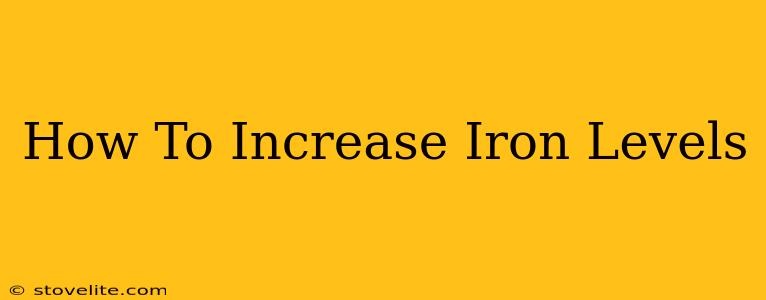Iron is a vital mineral essential for numerous bodily functions, including oxygen transport, energy production, and immune function. Iron deficiency, or anemia, is a common condition that can leave you feeling fatigued, weak, and short of breath. Fortunately, there are several effective ways to increase your iron levels naturally, without relying solely on supplements. This comprehensive guide will explore the best strategies to boost your iron intake and improve your overall health.
Dietary Strategies to Increase Iron
The most effective way to increase your iron levels is through dietary changes. Focus on incorporating iron-rich foods into your daily meals. There are two main types of iron: heme and non-heme.
Heme Iron: The Superior Choice
Heme iron, found in animal products, is more readily absorbed by the body than non-heme iron. Excellent sources include:
- Red meat: Lean beef, lamb, and venison are all rich in heme iron.
- Poultry: Chicken and turkey, especially dark meat, contain a good amount of iron.
- Seafood: Shellfish, such as oysters and clams, are particularly high in iron.
Non-Heme Iron: Important for Vegetarians and Vegans
Non-heme iron, found in plant-based foods, is less easily absorbed but still crucial for vegetarians and vegans. To maximize absorption:
- Pair with Vitamin C: Consuming non-heme iron sources alongside vitamin C-rich foods, such as citrus fruits, strawberries, and bell peppers, significantly enhances absorption.
- Avoid Inhibiting Substances: Limit consumption of substances like tea, coffee, and calcium-rich foods (dairy products) with your iron-rich meals, as they can hinder iron absorption.
Excellent sources of non-heme iron include:
- Legumes: Lentils, beans, and chickpeas are excellent vegetarian and vegan options.
- Dark Leafy Greens: Spinach, kale, and collard greens are packed with iron and other essential nutrients.
- Fortified Foods: Many breakfast cereals and grains are fortified with iron. Check the nutrition labels.
- Dried Fruits: Raisins, apricots, and prunes are good sources of iron.
Lifestyle Factors Affecting Iron Absorption
Beyond diet, certain lifestyle factors can significantly impact your body's ability to absorb iron.
Improve Gut Health
A healthy gut is essential for optimal nutrient absorption, including iron. Consider incorporating probiotics through fermented foods like yogurt and kimchi, or probiotic supplements. Also, ensure you're getting enough fiber for regular bowel movements.
Avoid Alcohol
Excessive alcohol consumption can interfere with iron absorption and overall health. Moderate or eliminate alcohol intake to support better iron levels.
Treat Underlying Conditions
Certain medical conditions, such as celiac disease and inflammatory bowel disease, can impact iron absorption. Addressing any underlying health issues is vital for improving iron levels. Consult with your doctor if you suspect an underlying condition.
When to Consult a Doctor
If you suspect you have an iron deficiency, it’s crucial to consult your doctor. They can perform blood tests to determine your iron levels and recommend the most appropriate course of action. Don't self-treat; medical advice is essential for managing iron deficiency. Symptoms of iron deficiency include fatigue, weakness, shortness of breath, pale skin, headaches, and dizziness.
Conclusion: A Holistic Approach to Iron Management
Increasing your iron levels naturally involves a multi-faceted approach encompassing dietary changes, lifestyle adjustments, and medical guidance when necessary. By focusing on iron-rich foods, pairing them with vitamin C, avoiding iron absorption inhibitors, and maintaining a healthy lifestyle, you can effectively boost your iron levels and improve your overall well-being. Remember that consistency is key, and seeking professional medical advice is crucial for accurate diagnosis and personalized treatment.

